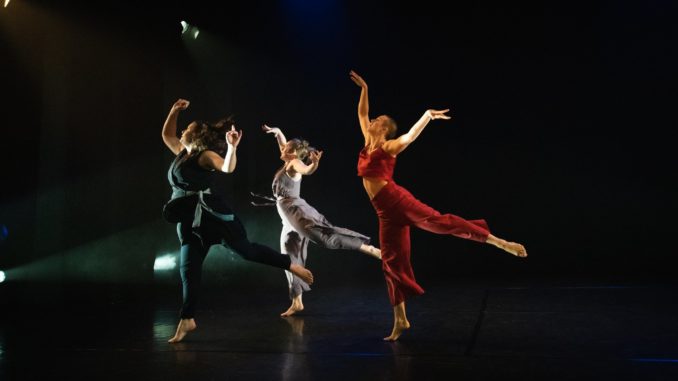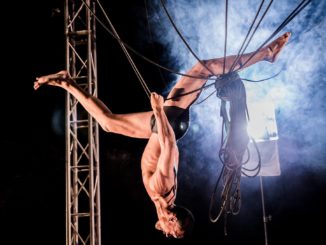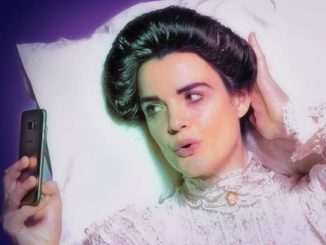
[Dance Taonga]
“I want to place in your mind, the Orchid as a symbol of the feminine divine.
A mysterious and potent allegory for the dark and light masks of the female psyche”.
ORCHIDS returns for a second staging having sold out its premiere season at Tempo Dance Festival in 2017. Choreographed and directed by Foster Group Dance’s Sarah Foster-Sproull, this time around the work is generating significant print, radio and social media interest. ORCHIDS was co-created with performers Marianne Schultz, Katie Burton, Rose Philpott, Jahra Wasasala, Joanne Hobern, Tori Manley-Tapu, Joanne Hobern, and Ivy Foster – a multigenerational collection of dancers with broad combined experience.
One challenge for full-length contemporary works is negotiating the fine balance between abstraction and literal representationalism. Generally, contemporary dance rejects the strictly narrative form (one of the features that distinguishes it from classical genre), however, in order to communicate thematic or emotional content it must retain ‘signposts’ for the audience. It is one of Foster-Sproull’s great choreographic strengths that striking this balance appears simultaneously effortless and carefully considered; ORCHIDS is no exception. The hour-long work delivers strong imagery, tangible emotional content and skilled use of repetition. At the same time, ORCHIDS leaves space for thought – for audience members to relate, emote, observe and to be as active or passive in their observation as they wish. The work is sophisticated rather than bombastic, it is feminist without becoming pedagogical. There is scope to attribute personalised, spiritual or iconographic meaning to the movement, and scope to extrapolate significance to wider contemporary events.
Foster-Sproull’s choreographic and directorial skill is on show here; ORCHIDS is rich, dense, well-rehearsed dance that does not fall into the trap of moving too far into the realms of performance art or physical theatre. Foster-Sproull is a choreographer, these are dancers, this is dancing. Here is an artist who has found her niche, and she wields her signatures with consideration and assurance. As always, eyelines are deliberate and unusual, hands and arms adorn bodily peripheries, creating moving sculptures both wonderful and strange. In ORCHIDS this motif has been reimagined to construct symmetrical images of orchids emerging from dark places. The most memorable of these appears like a mythical, six-headed creature, fascinating and omniscient. Although on opening night there are minor issues with unison in the front row, the image and intention endures and succeeds. Similarly, hands and arms are used to exaggerate body parts and draw focus to them, creating moments of super-human strength or restrictions of individual freedoms. Swarming ensemble work and a tapestry of groupings throughout ORCHIDS ensures a sense of forward momentum, enhanced by an attractively instrumental score by composer Eden Mulholland.
While ORCHIDS is unmistakeably Foster-Sproull’s work, her collaborative process means that her selection of dancers is central to the work’s creation. Exploring relationships between women necessitates consideration of multiple generations, matriarchy, lineage. Three atypical casting decisions embed this concept in the audience’s consciousness before the performance even begins. Marianne Schultz, in her sixties, is at her strongest in the opening moments with Tori Manley-Tapu, but loses some presence, extension and momentum during the course of the work. Katie Burton embodies the hand-me-down nature of vocational dance (as a Unitec Dance Lecturer she has taught four of the cast members) and her onstage relationships are multifaceted and delightful. Nine-year-old Ivy Foster completes the lineage, played like an ace at the end of the work. At once a golden fairy-child and the reincarnation of ancient wisdoms, Foster is disarmingly self-aware, beautifully calm.
Manley-Tapu is at her best in Foster-Sproull’s choreography – endlessly warm, elegant and generous with her focus. Similarly, Rose Philpott delivers a strong and individualised performance, with impressively fluid floor work. Jahra Wasasala is attenuated power, her body modification and physical control transiting her from blank canvas to living artwork. Wasasala’s solo showcases her brilliantly detailed articulation, and ORCHIDS shows her in a more sophisticated and subtle light than other works. Joanne Hobern delivers what I consider to be the strongest performance of her career to date. With a newly shaved head, she is an androgynous soubrette, contributing vital higher levels to the work via superbly effortless elevation.
Sparingly-used set design by Andrew Foster is spot on; a simple black gauze suspends, drops and lifts without pulling focus from the choreography or the dancers. Lighting by Jennifer Lal is similarly subtle, predominately dark and naturalistic. This second season of ORCHIDS has a new collection of costumes, designed by Rose Philpott and Tori Manley-Tapu. Each dancer is costumed differently, the range of garments including generally-fluid dresses, pants and overalls, and the colour palette covering black, browns, red and greens. Costuming is the least cohesive element of ORCHIDS and could be harmonised by standardising the fabrication and deliberately exposing or concealing foundation garments. It is perhaps unintentional that the youngest, leanest bodies are dressed in costumes that reveal the most skin, but this feature does not serve the production as well as it might.
ORCHIDS as a New Zealand dance work is in many ways a taonga. It has been percolated, not rushed. There has been time for the collaborators to experiment, and for the dance to mature. In Western spirituality the divine feminine refers to the place in each person that holds intrinsic knowledge of intuition, compassion, wisdom and empathy. Audience members may interpret this through mythical, spiritual or religious iconographies and characters. The work may also speak to experiences of women’s energy, dynamic identities, violence, grief or rage. ORCHIDS’ timing is essential – now, more important than ever, the world needs women to reject radically the entrenched patriarchal instruction to judge, evaluate, rank and betray. We have learned to police one another rather than turning our eyes to the real threat in the shadows. Perhaps ORCHIDS allows the space for me to move tangentially away from its choreographic intention. Or perhaps this is its point, after all.
ORCHIDS plays Circa Theatre till 27 July.




Leave a Reply